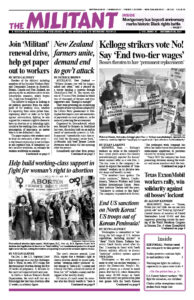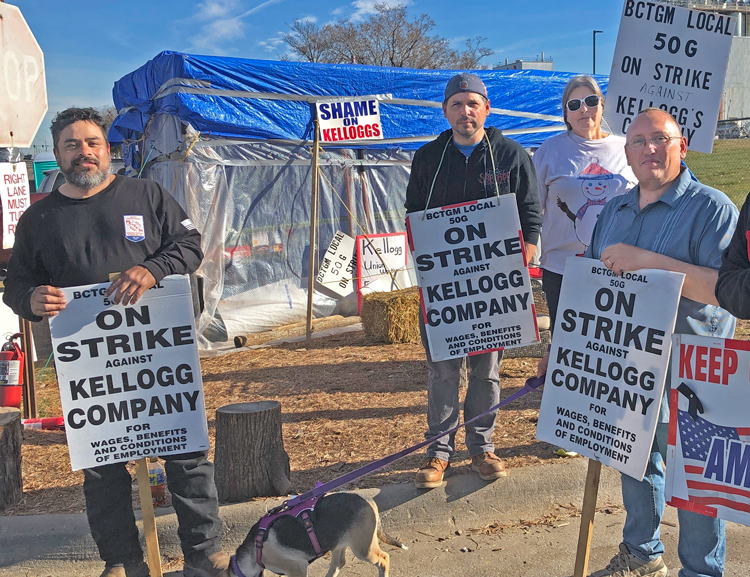MEMPHIS, Tenn. — Kellogg’s workers on strike at the company’s four cereal plants across the country overwhelmingly rejected the bosses’ latest contract offer in a vote Dec. 5. The key issue is the company’s demand to expand the number of “transitional” workers on its divisive two-tier wage and benefits system.
“The members have spoken. The strike continues,” Bakery, Confectionery, Tobacco Workers and Grain Millers International Union President Anthony Shelton told the press. “Solidarity is critical to this fight.” The company responded with threats. “The prolonged work stoppage has left us no choice but to hire permanent replacement employees in positions vacated by striking workers.”
“Since 2015 the company has been promoting divisions among the workers and union members with the two-tier system,” Bobby Burress, a 14-year veteran of Kellogg’s cereal plant, told this Militant worker-correspondent on the picket line Dec. 4. “We’re on strike to try to overcome that.
“When we took the strike authorization vote this time, there was strong support in favor of going out,” Burress said. “Between the current labor shortage and the company’s product shortage, we felt like we had more leverage.” This is the first contract strike at Kellogg’s in decades.
The 274 members of BCTGM union Local 252G here went on strike Oct. 5, along with 1,100 other workers at Kellogg’s cereal plants in Omaha, Nebraska; Lancaster, Pennsylvania; and Battle Creek, Michigan.
‘Equal pay for equal work’
The divisive two-tier system is the single biggest issue in the strike. That’s why “Equal pay for equal work” signs are among the most popular on the picket line here and at the other plants.
A tentative agreement on a new five-year master contract was announced Dec. 2, a month after the BCTGM International Union negotiating committee had voted down the company’s “last, best and final” offer Nov. 4, continuing the strike.
Voting on the new proposal took place Dec. 5 at Local 252G’s union hall, following a meeting the day before for all union members to learn about and debate the new proposal.
“We’ve had a lot of support from other unions in Memphis in the last two months,” Burress said. “And union members from the other striking Kellogg’s plants have visited us and we’ve visited them.” Contributions to a GoFundMe account have added to the $105 a week strike pay from the union, he added. Nonstop honking by motorists and truck drivers passing the picket line is another indication of how many working people know about and support the strike.
The two-tier setup, pushed through by the company in 2015 under threat of closing two of the cereal plants, allows the company to employ up to 30% “transitional” workers at the plants. These workers do the same jobs as longtime employees, but are paid much lower wages, have no pension, and pay much higher health care costs. These “transitional” workers were supposed to be promoted over time to the top tier, but few have made it, pickets said.
In discussing the contract rejected by strikers, BCTGM Local 50G President Dan Osborn said, “My biggest concern is that they lifted the amount of lower-tier employees they can employ.”
Other issues in the current contract fight include defending union members’ much needed cost-of-living clauses, retirement benefits and holiday and vacation pay.
One of the places where workers are angriest at the bosses is in Battle Creek, where the company was founded in 1906. Bosses there say they plan to lay off at least 174 workers by the end of 2023, on top of layoffs of 223 in 2018 and 67 more in 2019. In their September announcement of the cutbacks, they said that “some locations are more cost-effective and better performing” and steps are needed to “drive increased productivity,” that is speedup.
Kellogg’s strikers were among the unionists, Black rights and community activists, students and others who turned out at the Blues City Brewery here Nov. 8 to back workers fighting for their first union contract. The brewery workers had voted to join the BCTGM in December 2020. This November, they voted unanimously to approve a three-year contract, including defeating bosses’ demands for a two-tiered wage system the company tried to impose on the newly organized union local.


